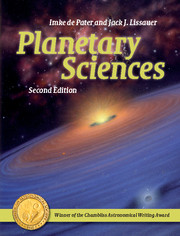Book contents
- Frontmatter
- Contents
- List of Tables
- Preface
- 1 Introduction
- 2 Dynamics
- 3 Solar Heating and Energy Transport
- 4 Planetary Atmospheres
- 5 Planetary Surfaces
- 6 Planetary Interiors
- 7 Magnetic Fields and Plasmas
- 8 Meteorites
- 9 Minor Planets
- 10 Comets
- 11 Planetary Rings
- 12 Extrasolar Planets
- 13 Planet Formation
- Appendix A List of Symbols Used
- Appendix B Acronyms Used
- Appendix C Units and Constants
- Appendix D Periodic Table of Elements
- Appendix E Observing Techniques
- Appendix F Interplanetary Spacecraft
- Appendix G Recent Planetary Images
- References
- Index
- Plate section
13 - Planet Formation
- Frontmatter
- Contents
- List of Tables
- Preface
- 1 Introduction
- 2 Dynamics
- 3 Solar Heating and Energy Transport
- 4 Planetary Atmospheres
- 5 Planetary Surfaces
- 6 Planetary Interiors
- 7 Magnetic Fields and Plasmas
- 8 Meteorites
- 9 Minor Planets
- 10 Comets
- 11 Planetary Rings
- 12 Extrasolar Planets
- 13 Planet Formation
- Appendix A List of Symbols Used
- Appendix B Acronyms Used
- Appendix C Units and Constants
- Appendix D Periodic Table of Elements
- Appendix E Observing Techniques
- Appendix F Interplanetary Spacecraft
- Appendix G Recent Planetary Images
- References
- Index
- Plate section
Summary
From a consideration of the planetary motions, we are therefore brought to the conclusion, that in consequence of an excessive heat, the solar atmosphere originally extended beyond the orbits of all the planets, and that it has successively contracted itself within its present limits.
Pierre Simon de Laplace, The System of the World, 1796The origin of the Solar System is one of the most fundamental problems of science. Together with the origin of the Universe, galaxy formation and the origin and evolution of life, it is a crucial piece in understanding where we come from. Because planets are difficult to detect and study at interstellar distances, we have detailed knowledge of only one planetary system, the Solar System. Data from other planetary systems around both main sequence stars and pulsars are now beginning to provide further constraints (Chapter 12). But even though 98%; of known planets orbit stars other than the Sun, the bulk of the data available to guide modelers of planet formation is from objects within our Solar System. Models of planetary formation are developed using the detailed information we have of our own Solar System, supplemented by astrophysical observations of extrasolar planets, circumstellar disks and star-forming regions. These models are used together with observations to estimate the abundance and diversity of planetary systems in our galaxy, including those planets which may harbor conditions conducive to the formation and evolution of life (§12.5).
- Type
- Chapter
- Information
- Planetary Sciences , pp. 512 - 553Publisher: Cambridge University PressPrint publication year: 2010



